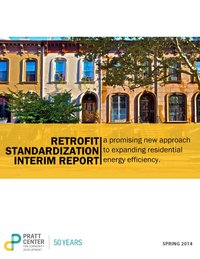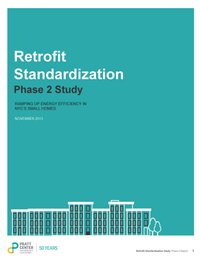Pratt Center launched the Retrofit Standardization Initiative to test a simplified, scalable approach to implementing energy efficiency upgrades in New York City’s 1-4 family buildings.
Although small homes are not New York City’s most egregious energy wasters, they comprise two-thirds of the city’s building stock and account for 17% of the city’s carbon emissions.
Retrofitting half of the city’s small homes would save homeowners at least $255 million annually, create over 2,500 jobs, improve indoor health and safety, and preserve the building stock. But achieving this requires a dramatic increase in retrofit implementation; no more than a few dozen small home retrofits are completed annually in New York City under the State’s energy efficiency programs.
To address this, we sought to capitalize on the redundancy in the building stock by developing a standard package of energy retrofit measures based on building typology. This package could help mitigate the pervasive barriers to retrofit implementation, and accelerate small home retrofits throughout the city.
Phase 1
In the first phase of the study, energy audits were conducted on 22, two-family, attached, gas-heated, masonry homes. This Interim Report describes the study’s progress, and details our analysis from the first year and a half. The study identified a clear set of measures applicable to every building in the study’s sample set. This starter retrofit package has an estimated average cost of only $3,312 with expected annual utility savings of 14% and a Savings to Investment Ratio (SIR) of 1.74. We also found that if additional conditional measures could be added to the package, it would raise energy savings in many homes to 21%.

Downloads
Phase 2
Completed in September 2015, the second phase of the study continued the testing begun in the first phase by examining the process, especially the interactions with homeowners, required to scale a standardized approach to energy retrofits. We offered a pre-determined set package of energy retrofit measures which included:
- air sealing and weather stripping the residence and basement,
- insulating the roof hatch,
- insulating basement pipes,
- replacing incandescent light bulbs with LEDs,
- installing low-flow water fixtures,
- adjusting the hot water temperature,
- installing carbon monoxide and smoke detectors, and
- ensuring adequate fresh air access for the boiler’s combustion process.
The Phase 2 study details minor logistical and technical challenges, as well as insights regarding homeowner engagement that will help inform outreach and engagement strategies in the next phase of the project.
